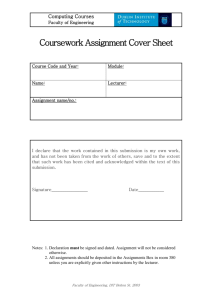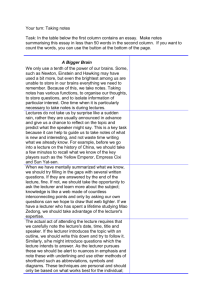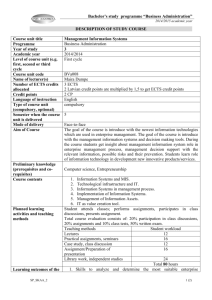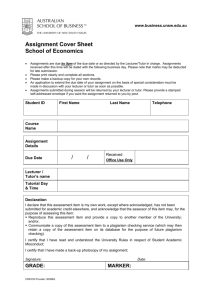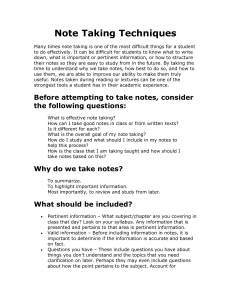MGMT320 Internat Bus
advertisement
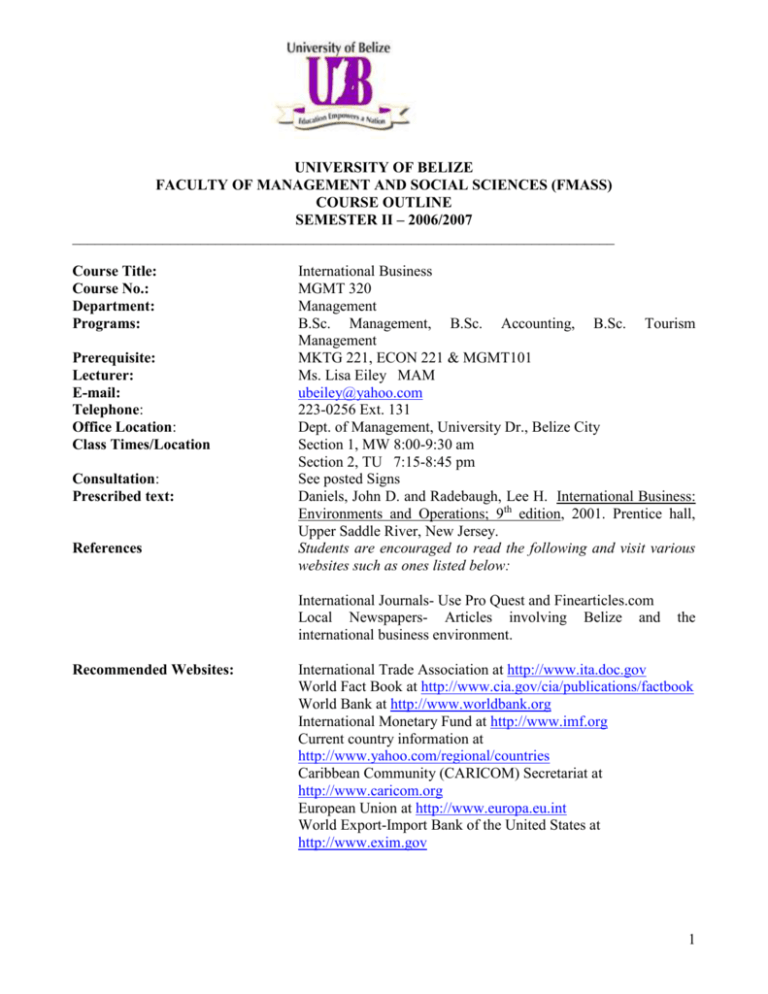
UNIVERSITY OF BELIZE FACULTY OF MANAGEMENT AND SOCIAL SCIENCES (FMASS) COURSE OUTLINE SEMESTER II – 2006/2007 ________________________________________________________________________ Course Title: Course No.: Department: Programs: Prerequisite: Lecturer: E-mail: Telephone: Office Location: Class Times/Location Consultation: Prescribed text: References International Business MGMT 320 Management B.Sc. Management, B.Sc. Accounting, B.Sc. Tourism Management MKTG 221, ECON 221 & MGMT101 Ms. Lisa Eiley MAM ubeiley@yahoo.com 223-0256 Ext. 131 Dept. of Management, University Dr., Belize City Section 1, MW 8:00-9:30 am Section 2, TU 7:15-8:45 pm See posted Signs Daniels, John D. and Radebaugh, Lee H. International Business: Environments and Operations; 9th edition, 2001. Prentice hall, Upper Saddle River, New Jersey. Students are encouraged to read the following and visit various websites such as ones listed below: International Journals- Use Pro Quest and Finearticles.com Local Newspapers- Articles involving Belize and international business environment. Recommended Websites: the International Trade Association at http://www.ita.doc.gov World Fact Book at http://www.cia.gov/cia/publications/factbook World Bank at http://www.worldbank.org International Monetary Fund at http://www.imf.org Current country information at http://www.yahoo.com/regional/countries Caribbean Community (CARICOM) Secretariat at http://www.caricom.org European Union at http://www.europa.eu.int World Export-Import Bank of the United States at http://www.exim.gov 1 The International Business Arena The increasing globalization of the market place affects all who are involved with business or who must make business decisions. Even those who are not directly involved in international business are affected in their domestic operations by international events and by the business activities of foreign entities. Therefore, it is imperative to be knowledgeable about the international business systems. This decade will pose many challenges and opportunities, particularly for newly industrialized countries (NIC). Three primary causes of these challenges are: first, these countries have become fierce competitors for the manufacture of high tech goods. Second, integration of the European Community has now created the largest trade block. Third, the acute international debt crisis keeps threatening the world financial structure and economic growth. This crisis has redirected the trade pattern away from the poor countries to the richest, and likewise has concentrated capital flows among the rich countries. However, in recent times we have been observing a shift back to LCD’s, particularly in industries that are labor intensive. In the Caribbean region we are moving towards the Caribbean Single Market & Economy (CSME), consequently understanding regional integration and Belize is imperative for students of business. COURSE DESCRIPTION Introduces the concept of international business as a system and the theories which underlie it; institutions which are visual evidences of it; production, marketing, financial, legal and other subsystems which comprise the total system. It also examines national governmental and international institutional controls and constraints, which impact the environment in which the system operates. The successful search for new markets implies an appreciation of these issues and an understanding of the forces at work in the international business environment. We will therefore discuss: Economics and politics of international trade Mechanics of international financial transactions permitting the initiation and settlement of trade Accounting systems that allow countries to monitor and manage the transfer of resources and capital Trade Agreements and globalization Caribbean Single Market & Economy (CSME) NAFTA and World Trade Organization (WTO) Main institutions and intermediaries which facilitates the flow of resources (MNC’s supernational agencies and financial institutions, government agencies, private financial institutions) The legal mechanism and arbitration agencies permitting the settlement of international conflicts The global environment and its people, in terms of opportunities for new markets and outlets for goods and services Ethical issues confronting the international business community PREREQUISITE(S) Students must have successfully completed MGMT 101, MKTG 221, and ECON 221 with a grade of “C+” or higher. 2 COURSE OBJECTIVES Upon successful completion of this course, students will be able to: Analyze the role and impact of international business on national economic development. Explain how the economic, political/legal, and financial environments affect international business operations. Discuss how cultural and behavioral differences influence countries business practices, and how these differences can be addressed using appropriate strategies. Discuss international trade theory and how government and business decisions influence international trade. Assess the effects of current regional trade agreements and economic integration on developing countries. Discuss how environmental differences support or complicate marketing, export and import strategies. INSTRUCTIONAL METHODOLOGY Instructional Methodology will include a combination of lectures, class discussions, presentations and case studies. The lecturer will augment specific topics in the assigned text. Supplementary materials will be passed out by the lecturer as deemed necessary. Students are encouraged to share relevant articles etc. The class will be divided into teams for the purpose of group discussions and term projects. Your participation in class discussions and group is imperative. Students are expected to do all reading assignments before class. Whether or not you are in class you are responsible for all assignments. All assignments are to be handed up in hard copy. No exceptions will be made. Reading all the local newspapers and listening to local news is a requirement of this class. Be alert for all matters involving international business and globalization. This class involves more than just reading and showing up for lectures; much of the learning will emanate class discussions so do not just show up for class, read, show up and participate. Evaluation: Tests (3) Case Analysis (2) Participation/Quizzes Final Exam Total 30% 20% 10% 40% 100% Tests: There will be three tests weighted 10% each. Tests may include a combination of multiple choice, essays and cases analyses. Case Analysis The class will be given two cases throughout the semester for individual written submission. Each case must thoroughly answer the questions following the case in a typed, hard copy format. 3 Class Participation The student is expected to prepare assigned chapters/handouts before each class. S/he is also expected to keep up to date on current business news, as the international business environment is a dynamic one. The quality of the student’s input to class discussions will determine how much of the remaining balance s/he will receive. Participation, defined broadly, includes attendance both in class and group meetings. High levels of participation would include active participation in class discussions (especially when that involves drawing others into the discussion) and might also include bringing information from outside sources (work/life experience, journal/magazine/newspaper articles, books, etc.) that enrich the learning experience of the class. NOTE: If students fail to participate or show lack of reading and participation, the lecturer will implement a “pop quiz” policy and quiz grades will be measured at 80% of the participation grade and the remaining 20% will be based on exceeding expectations. Marks for classroom contribution will be allocated in the following manner: Exceeds Expectations 9-10 Students in this category provide leadership in and out of the classroom and work toward enhancing the interpersonal dynamics of the class. Rather than dominating the setting, they act as facilitators, bringing others into the discussion. Meets Expectations 7-8 For showing an active interest in class activities and participating in classroom discussions; for regularly making insightful comments which help others to understand the course material; for being a positive group member, etc. Does not Meet Expectations 0-6 For attending class on a regular basis and only occasionally contributing to the classroom experience. 0 For failing on all of the previously identified ways of contributing. Final Exam: The final examination will be cumulative and worth 30% of your final grade. CLASSROOM POLICIES Late Submissions Late assignments submitted within one day past the due date, without prior approval from the lecturer, will be penalized by one letter grade. Deferred test policy If a student misses a test s/he must submit a letter (on a proper letterhead) justifying her/his request for a deferred test (attach supporting documents where possible), and deliver it either in person or via a representative later than the next class meeting. The same applies to requests for deferred tests submitted prior to the scheduled test date. In such cases the lecturer will arrange a deferred test or other appropriate means of evaluation. If a student misses a test without any excuse or permission, s/he will automatically receive a grade of ‘0’ for that test. Note: In cases where the lecturer does not accept a student’s justification for a deferred test, the student can appeal this decision to the academic dean. Academic Dishonesty There is zero-tolerance for any form of academic dishonesty. Academic dishonesty includes “borrowing” business plans from past or present students, and the Internet, borrowing exam papers, plagiarism, sharing individual assignments, and copying other people’s work. Be familiar with 4 university regulations governing academic dishonesty. At the very least, anyone/any group found guilty of any academic crime will receive a grade of zero. Quoting Sources and Documentation In the world of academia, it is mandatory for anyone who uses material that is not his/her own to quote his or her sources. Students must ensure that the source of any idea/material that is not their own is properly acknowledged in the reference/bibliography section of their work. Improper referencing will be penalized. UB’s POLICIES The following policies apply to all students. Please read and follow carefully. See Student Handbook for further reference. Dress Code for Presentations/Guest Lectures/Internships Students are expected to dress professionally for presentations, guest lectures, and for internships. Professional dress for males includes, but not limited to, slacks, shoes, or dress appropriate for the presentation. Professional dress for females includes, but not limited to, slacks/skirts, sleeved top, shoes, or dress appropriate for presentation. Attendance If students are to obtain maximum benefits from taking a course, regular attendance is essential. The responsibility of meeting all class assignments including tests and research papers lies with the students. In order to get the full value of any course taken, students must attend no less than eighty percent (80%) of the classes scheduled for the course. Students who attend less than eighty percent of the contact hours for a course without making alternate arrangements, miss important learning experiences and reduce the value of the course. This diluted experience cannot be seen as equivalent to the full impact of the course when a student attends regularly, therefore, any student with more than 20% unexcused absences in a course may receive a grade that reflects less than optimal mastery of the full course content. Tardiness Tardiness is a distraction to your classmates and to your lecturer. If you must be late, please enter the room as quietly as possible and take a seat near the door. You may pick up any papers that were handed out or returned at the end of the session. Electronic Devices All electronic devices should be turned off during class sessions. The exceptions are cell phones or pagers in “silent or vibration mode”. When receiving phone calls, students are asked to do so outside the classroom and to keep these disturbances to a minimum. No recording of lectures should be done without the permission of the lecture. Classroom Conduct Students are asked not to eat nor smoke in classrooms. Students should refrain from talking/reading or doing other things unrelated to class during class sessions. 5 Language Since English is the official language of Belize, you are expected to speak and write Standard English in the classroom. Lecturers will subtract points that have constant grammar and punctuation errors. Late Assignment Assignments are due on specified dates at specified places according to specified criteria. Acceptance of late assignments is at the discretion of the lecturer; however, it will be subject to penalties. Test-taking Policy Students are expected to take all tests. If a student misses a test due to unforeseen circumstances such as illness, personal emergencies or death of an immediate family member, she or he must inform the lecturer either in person or via a representative (if the student is ill or unavailable) no later than the next meeting of the class. In such cases, the lecturer will arrange a deferred test or other appropriate means of evaluation…If a student misses a test without any excuse or permission, she or he will automatically receive a grade of 0 for the test. In the event that a lecturer does not accept a student’s justification for a deferred test, the student can appeal this decision with his or her academic dean. 6 COURSE TOPICS *This schedule is subject to change. If changes are necessary, students will be informed. WEEK TOPIC CHAPTER (S) Background for International Business Introduction Modes of International Business Background for International Business (Contd) External Influences on International Business Comparative Environmental Frameworks Cultural Environment facing Business 1 Comparative Environmental Frameworks Cultural Environment facing Business 2 4 Feb 5 - 9 Comparative Environmental Frameworks Political and Legal Environments 3 5 Feb 12-16 Comparative Environmental Frameworks Economic Environment 6 Feb 19-23 Test #1 (Chapters 1-4) Tentative 1 Jan 15-19 2 Jan 22-26 3 Jan 29- Feb 2 7 Feb 26-Mar 2 8 Mar 5-9 1 2 4 5 Theories and Institutions: Trade International Trade Theory Theories and Institutions: Trade Government Influence on Trade 6 Theories and Institutions: Trade Economic Integration and Cooperative Agreements 7 March 5th-Baron Bliss Holiday (No class) 9 Mar 12-16 Managing Business Functions Internationally Foreign Direct Investment 10 Mar 19-23 Managing Business Functions Internationally 11 Mar 26-30 Test #2 (Chapters 5-8, 11) Tentative Apr 2-9 8 Governmental attitudes toward FDI 11 12 Int’l Business negotiations and diplomacy Easter Break- April 2-9th!!!! 7 12 Apr 10-13 Foreign Exchange Market 9 Determination of Exchange Rates 10 13 Apr 16-20 Marketing 16 14 Apr 23-27 15 Apr 30-May 4 16 May 7-9 Case Analysis #1 Due!! Marketing Test 3 (Chapters 9-10, 12, 16) Tentative April Export and Import Strategies 30th 16 17 – Labor Day (no class) Case Analysis #2 Due!! Review for Final Exam May 9th-Last Day of Class 17 May 11-17 Final Exams Week!! (Date and Time will be announced) 8
